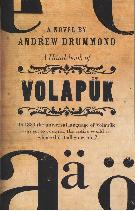The Scotsman, 19th August 2006 
'Just like An Abridged History, all this is backed up by credible geography, a good knowledge of railway history and even tramway history for 1891, so once the reader buys the central narrative character, Mr Justice the organ-tuner, his increasingly baffling adventures roll out with a Volapük lesson every few pages to keep the attention sharp. The whole book is a joke: the advertisements at the end are a joke: the translations are a joke. It's a long joke, but on balance it works.'
Scotland on Sunday, 27th August 2006 
'It is difficult to conceive of the ambition Drummond brings to this novel. The book is framed with a traditional mystery, complete with body parts, a swooning maid and a mysterious message. Language is a great subject for Drummond as he is clearly a master of it, so much so that he spends his time on creating new ways to fool, beguile and wow readers. This is a lively book, sparkling with wit and ideas, but it is also no-mean commentary on an era...'
The Independent, 1st September 2006 
'As a wildly comic and surreal satire of every pedantry going, it could scarcely be bettered. The main theme of this delirious fantasy is the obsessional attraction of systems and procedures, and the zeal of their proponents. This is a hugely inventive second novel: don't miss its appendices and, as with
Abridged History, the closing advertisements. There's only one word for his achievement:
Bafö!'
Sunday Herald, 10th September 2006 
'The campaign for a universal language may sound a dry subject. Not so in Andrew Drummond's A Handbook of Volapük, a cornucopia of wit, fantasy and idiosyncrasy. Interspersed with lessons in Volapük, their content cunningly tied into the crazy plot, this seriously comic novel is one of a kind...
Pöfüdik!'
TimesOnline, 29th September 2006 
'Drummond`s writing happily bears comparison with [Alasdair] Gray's brand of Gothic fantasy... The novel is a send-up of academic squabbling, bureaucratic faffing and intellectual egotism...'
The Melbourne Age 25 November 2006:
'...This mercilessly funny novel...A Handbook of Volapuk is an entertaining comic ride into a most peculiar linguistic curiosity.'
Professor Michael D. Gordin, August 2018:
(Rosengarten Professor of Modern and Contemporary History, Princeton University, and author of
Scientific Babel, 2015)
'
A Handbook of Volapük is not only my favorite novel about constructed languages ... but it is also the most useful textbook of Volapük that I’ve found. ... The construction of [the] novel is simply brilliant. So much research on constructed languages, so many lovely inside jokes, and the plot and characters work on their own terms as fiction.'
Amazon Customer reviews: 
'This is a very entertaining historical novel with several scenes that made me laugh out loud... [The hero's] conflicts with the proponents of other constructed languages are hilarious and will seem startlingly familiar to anyone who has been involved in this milieu.'
'The structure of the book, with the preface and postscript by the phrenologist who discovered Mr. Justice's papers and edited them for publication, and the main section with Mr. Justice's narrative of his travels interspersed with lessons in Volapük (more or less integrated into the narrative, in amusing ways) is very satisfying'
'Andrew Drummond, in his first novel An Abridged History and in this latest offering, is in process of creating a unique style of writing that keeps his readers on their toes. He displays a fertile imagination in constructing his plots, thoroughly backed up with research in order to accurately depict historical context...In addition to enjoying a good read, you can even learn the basics of this universal language, which may stand you in good stead should it ever catch on.'
Blog review (The Celestial Weasel), 30 November 2006: 
'...a fine book... It is one of those books that one is pleased has been done well because clearly once it has been done no-one can ever do it again... adding Urquhart to the novel is a stroke of genius...'
Esperanto USA (Bulletin of the Esperanto League for North America), Autumn 2006:
...The lessons...are generally as funny as the rest of the story; which is to say, very funny indeed...What more could you ask for?...'
Click here to read the entire review (which is here reproduced with thanks)...
 In April 1891, two matters greatly excite the inhabitants of Edinburgh: the decennial Population Census; and the Annual General Meeting of the Edinburgh Society for the Propagation of a Universal Language. The General Secretary of the Society, Mr. Justice, is a staunch champion of the highly-popular language "Volapük", which spread across Europe after 1884; but he is locked in a battle for ascendancy with Dr. Bosman, shameless apologist for "Esperanto". Other members of the Society promote inferior Universal Languages, and rightly merit Mr. Justice's contempt.
In April 1891, two matters greatly excite the inhabitants of Edinburgh: the decennial Population Census; and the Annual General Meeting of the Edinburgh Society for the Propagation of a Universal Language. The General Secretary of the Society, Mr. Justice, is a staunch champion of the highly-popular language "Volapük", which spread across Europe after 1884; but he is locked in a battle for ascendancy with Dr. Bosman, shameless apologist for "Esperanto". Other members of the Society promote inferior Universal Languages, and rightly merit Mr. Justice's contempt. A Hand-book of Volapük and an Elementary Manual of its Grammar and Vocabulary,
A Hand-book of Volapük and an Elementary Manual of its Grammar and Vocabulary,